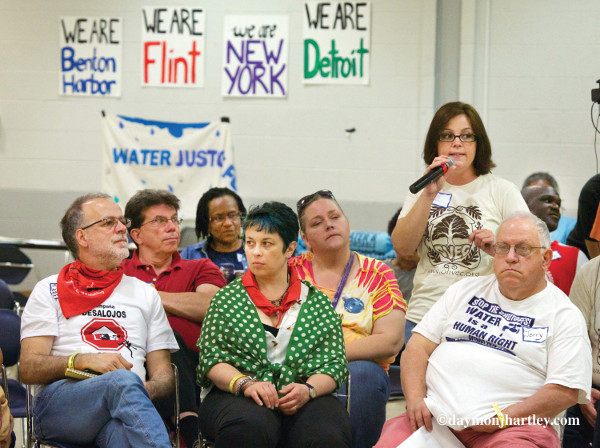Dear Readers,
On this page we bring you voices from the unprecedented and inspiring International Social Movements Gathering on Water and Affordable Housing, held in Detroit Michigan in May. We will continue our coverage in our August edition.
In this conference, people came together to share experience nationally and worldwide on the struggle to make access to clean water and housing a human right.
Michigan and the “Rust Belt” in general, is a harbinger of what is to come to America if we do not act. Detroit, Michigan, for example, once known as the “auto capital of the world,” is now devastated by automation, plant shut downs, and the resulting permanent unemployment.
Rather than provide for the needs of impoverished and displaced workers, the rulers have put unelected corporate-backed Emergency Managers into power in Michigan cities to oversee the transition from a state in which workers once thrived to one that cares only about banks, speculators and profits.
Capitalism will not provide for workers it no longer needs. That is why the masthead of the People’s Tribune says: an economic system that doesn’t feed, clothe and house its people must be and will be overturned and replaced with a system that meets the needs of the people.
Please use the People’s Tribune as a vehicle to help build this movement, to create a vision of a better world and a strategy to achieve it. Write for the People’s Tribune. Donate. Order copies to get out in your community. Email info@peoplestribune.org for more information. — The Editors
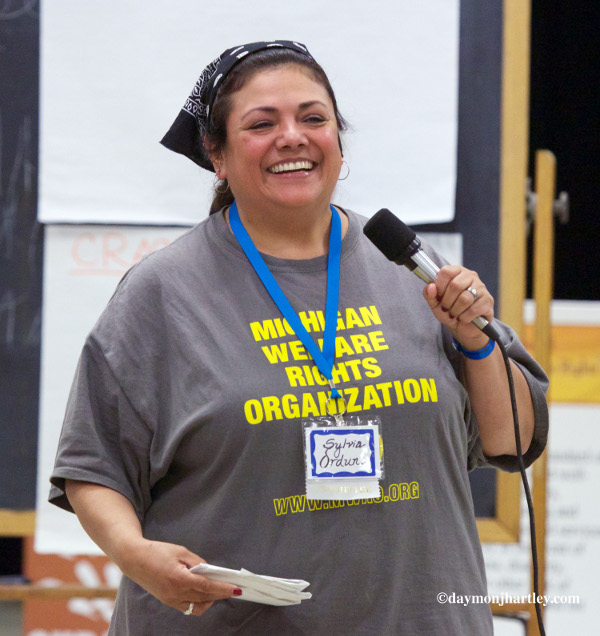
PHOTO/DAYMONJHARTLEY.COM
Participants at the International Social Movement Gathering on Water and Affordable Housing, held in Detroit. (The photos do not necessarily depict the people quoted on this page.) PHOTOS/DAYMONJHARTLEY.COM
On this page are excerpts from some of the many voices at the Water and Affordable Housing gathering in Detroit, MI. Our coverage will continue in our August edition. If you have articles or quotes to submit for publication, please email info@peoplestribune.org—The Editors of the People’s Tribune

“In 2012 the city stopped sending out water bills. Now residents are getting water bills for thousands of dollars. The bills are attached to your property taxes and you can lose your home. Now they want to dissolve the entire city of Highland Park, absorb it into Detroit, so we have no say so. All this was done behind closed doors. I wasn’t an activist or a politician. I had to to something. My goal was to wake up people. I started a newsletter, joined with other people fighting the same fight. I went to places where people were as mad as I was. If they weren’t mad, I made them mad. In our community we passed out newspapers, blew horns, waking people up, letting them know what’s coming and that this is our fight, in fact, it’s a world fight. This fight will not be won through the avenues that most people think. I wrote letters. I talked to senators, Conyers, etc., and they didn’t respond. If they don’t want to be held accountable, they need to get the Hell out of there. The people will win this fight. —Eban Morales, Highland Park, MI Human Rights Coalition
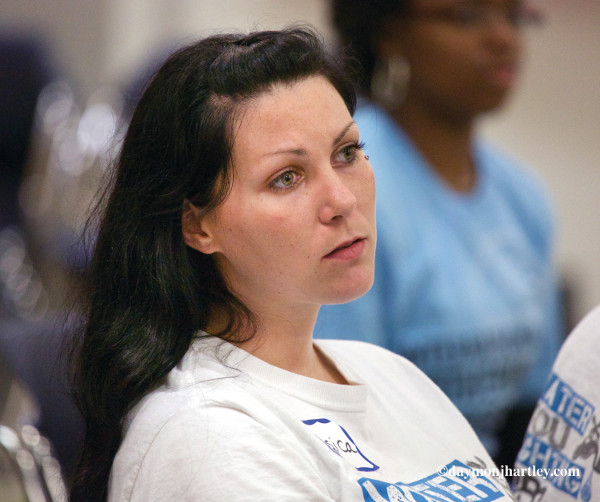
“We were switched by our Emergency Manager from Detroit water to the Flint River which is disgusting and contaminated. Thank you GM for dumping into it for about 88 years. We have been forced to drink, bathe and cook with contaminated water. As a response, our water plant has been adding more and more chemicals. We are being poisoned. I am sick. I have copper poisoning and lupus, all developed since October. All of my children have been to the doctor for rashes, hair loss, and muscle and bone pain. We are fighting a huge health crisis in Flint. You can’t escape it. When chemicals are released as steam, you absorb it through your eyes, skin, and clothes. Across our city, water is clear to blue to almost black. On top of this, they say they switched us to save money. Our bills quadrupled. I went from $80 a month to $700. If you refuse to pay your bill, they shut off your water, condemn and knock down your home to make it a cute tourist college town. Then the water department calls in CPS to take our children. We have no rights. They don’t want us here. We are filing an emergency injunction based on our health to get off the Flint River. The Emergency manager said it is too expensive but will not disclose the cost. They’re saying ‘keep suffering.’” — Melissa Mays, Flint, MI., Water You Fighting For
“I live in West Virginia. I didn’t think people had it as bad as we do. My heart goes out to you. Not only does our water unite us, but our struggles unite us. I buried my father at 52 years old. I buried so many family members. Raising my children in Appalachia means I have to watch our rivers and streams turn orange from chemicals and heavy metals. Last year, we had a major chemical spill: 300,000 people were poisoned. People turn on their faucets and the water is black. I am a coal miner’s daughter. I am a mother. And I am a proud Appalachian woman. I am here to stand with our brothers and sisters in Detroit. Let’s take our water back, our lives back, and our heritage back. These corporations do not own us. We, the people. It’s not about our skin color. We are human beings. This nation is fueled by the blood of my people. Nobody should be denied water. Appalachia stands with you. We protest, we rally, we fight our leadership that doesn’t stand with us. We need national collaboration. We need to take it to the streets.” — Paula Swearengin, Ohio Valley Environmental Coalition (OVEC)
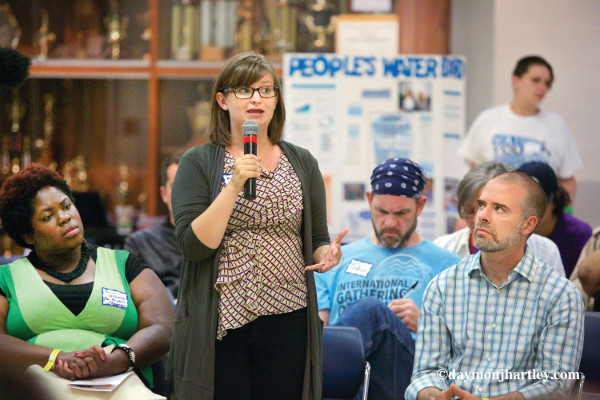
“We represent over 60 grassroots organizations and California Indian tribes. Twenty-two million people in California get their water from contaminated sources. Water affordability is closely linked to that. It costs a lot to clean contaminated water. We also have a draught and extraordinary mismanagement. Water defies gravity and flows upwards toward money. In 2008, we worked with international allies at the UN and started a campaign for the human right for water. After 4 ½ years of struggle, we got in 2012 the nation’s first law declaring a human right to water. It is a policy now that every human being in California has a right to clean, safe affordable water. Ground water is a huge resource but is not regulated by the state. Last year, we were part of a taskforce that got Californians voting to regulate ground water for the first time ever. Because we are well organized across the state, we are able to get our agenda over. I propose that this is a strategy that can be advanced.”
—Colin Bailey, J.D., Environmental Justice Coalition for Water in California
“We’re really glad the conference happened. We didn’t realize how many other communities are affected by water issues. We got to meet amazing influential people. We are part of “We the People of Detroit” and we partner with “Michigan Roundtable.” We show the music and stories from young people around the state. Our issues are racial inequities, water, housing, transit, criminal justice and education. We are helping with the water issues, putting together water stations where people can pick up water, a water hotline, and canvassing to inform people and to help those who need it. — Jada Patrick and Preston Welborne El (Jada and Preston are some of the youth who participated in the gathering)
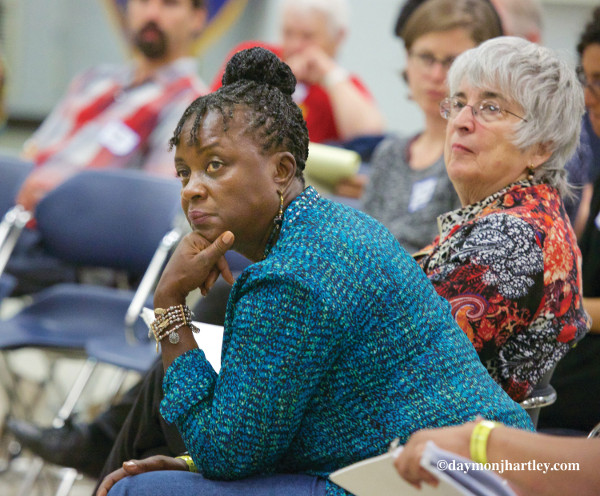
“The Russell Woods neighborhood in Detroit was once a very middle class community. It is now under attack by banksters. At one time you worked in an auto plant, had an industrial or government job, but those jobs are gone, the industrial base is gone. Taxes have gone up so high that people are often facing tax foreclosures as a result of the house not even being worth what they owe the taxes on. We have approximately 300 homes in foreclosure right now. Now, you can owe $10,000 in taxes for a single year; some owe $40,000. The average selling price is now $14,000. This is a neighborhood that had all of the promise of Detroit; an historic area because of the Black folks that lived here . . . the Supremes, Diana Washington, first football players. Now, schools are closing. They’re shutting off the water. This is an all out class war.” — Geo Errol Jennings, President, Russell Woods Neighborhood Association
“The movement toward national and state legislation for water affordability, accessibility and safety is one of the human rights issues of our time. We have a committee of 25 lawyers working on this legislation. This conference was the kickoff. Why just try to fix something here in Michigan? Baltimore, Atlanta, California have now become issues as well. The corporations are trying to take over water, the new gold.” — Attorney Alice Jennings, Detroit, MI
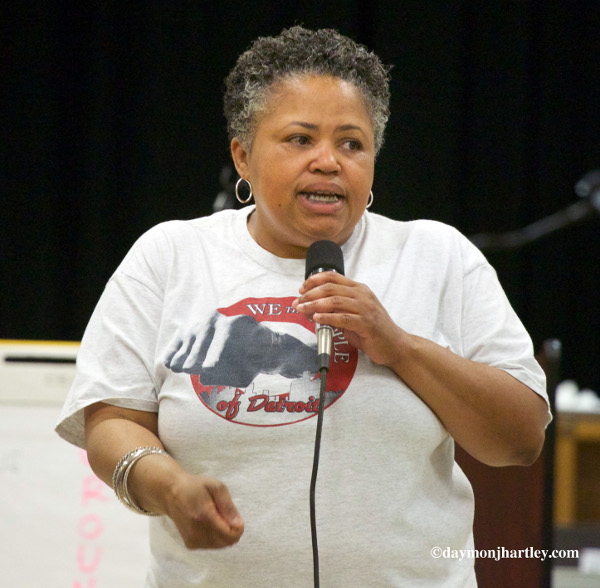
PHOTO/DAYMONJHARTLEY.COM
“We have to go to on the offensive. We have to begin calling for nationalization of water and housing, nationalization of education and healthcare. The government nationalized the auto industry a few years ago, but they channeled the money right back to the capitalists. This time, nationalization would mean that the profits would be for the whole of society and we would lead it. We have to demand this to have a better future.” — Marian Kramer, Michigan Welfare Rights Organization
Quotes from some of the international participants
“In Italy the people won a referendum on water—27 million Italians said water is a common good, not a commodity. Now, multinational companies and businesses in Italy are trying to undermine the referendum. They want to get a profit on water and they’re cutting off people who cannot pay for their house supply. Can we make a bridge between here and Italy and the rest of the world?” —Cesare Ottolini, Italy
“In Mexico, we have a 22-year process of privatization of water. My feeling here in Detroit is there is a fascist war against all people. Detroit is an example of the future of the planet. It’s similar to what is happening now in Mexico. We had 150,000 murders. In this context of violence is organized all the privatization and all the plunders. We need unity among the social organizations in Mexico, the US and Canada. This is the center of the social war on the planet. We need to exchange information and build international brotherhood.” —Andres Barreda, Mexico
“Venezuela declared that water was a vital element to overcome poverty, and to guarantee life with dignity. Therefore the government decided to nationalize the service. Furthermore, we enacted two laws: Water Law of 2001 and Water and Service law of 2007. Before 1998, only 55% of the population had access to drinkable water; today 96% of the country has access. The government made an $8.8 million investment to achieve that outcome from 2001 to 2012. In order to improve and address the water related issues in Venezuela, we created “water roundtables.” The community gets together and discusses its problems and issues regarding access to drinkable water . . . As of today, we have 9,000 water round tables nationwide and Venezuela has one of the lowest water bills in the hemisphere, around $5 a month . . . You are welcome to visit Venezuela and see for yourselves an impressive democratic experiment.”—Fravria Marquez, Venezuelan consulate representative (via skype)
“Access to drinkable and secure water is an essential, fundamental and universal human right because it determines the survival of persons.” This quote is from a recently released encyclical on ecological issues, issued by Pope Francis. (The Pope was not at the conference.)

